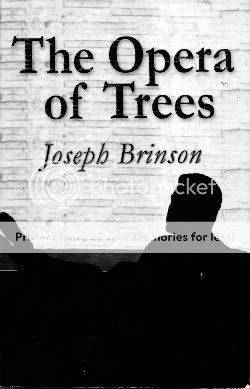I hope Joseph Brinson, author of The Opera of Trees, is the energetic embellisher, black comic artist, creative and crafty confabulator, as his poetry would seem to indicate, and that he takes great poetic license with his predominantly first person narrators who haunt the grotesque and uncomfortably honest sometimes, lines of his dark poetry.
"I hope I don't die / During the end of the world / I would hate to enter the afterlife / At the same time with billions of other people / You know I hate crowds".
I hope that smirking poem above (one of the rare "lighter" ones, and it's called "I Hope" coincidentally, one of my favorite ironic pieces from the book) is more about who Joseph Brinson truly is as a person rather than this:
"Joey, do you ever smile? / You used to smile a lot in high school," the opening line from "Smile"


I know it's at worst dangerous and in the least inappropriate to conflate a work's narrator and p.o.v. with its author and vice versa; imagine if Bret Easton Ellis' readers took Patrick Bateman of American Psycho infamy to literally be Bret Easton Ellis in the flesh, how outrageous a charge that would be! -- but the exceedingly Rimbaudian and Baudelarian despair displayed in Jospeh Brinson's bleak (though beautifully bleak it is) poetry, makes me queasy when I consider what could be the possible sources of its inspiration, knowing that how he's fashioned some of these topics on the page make them at least appear far too personal to have been pulled completely out of imaginary air -- specifically the particulars on addiction, mental illness, existentialism, loneliness, or in other words, the varied hells of unhappiness inhabiting the occupants of Brinson's poems.
Some addicts, the more transparent ones, like the ones Joseph Brinson documents in The Opera of Trees, when they're lucid, will admit they'd like to quit using, yet say with straight faces, "I am not looking to get clean," as one such addict admits in "Honesty"; an addict who knows also at some level he wants to be happier and healthier, but "I am not looking to get rational." And that's the tragic irrational logic stripped naked, of one willfully blinded by their addictions, and it's very reminiscent of the poetic lines and twisted reasoning of the characters in one of the more authentic fictional treatments on addicts ever penned, Denis Johnson's, Jesus' Son: Stories. In "Where I Live," Brinson reduces the addict-narrator's life to a checklist, one in which "reality" is rarely checked off. More realistic still, and yet bringing some seriously needed humorous levity to what would otherwise risk becoming major depression, is the outrageous resolution made by the addict in "New Year's Resolution":
"I promise to do more recreational drugs / And less prescription drugs".
Pardon me while I ruefully yet robustly laugh.
I think Joseph Brinson is at his finest in his more diminutive pieces where he showcases his extraordinary gifts of dialectical wit and sharp psychological insights. The longer poems, I felt, lacked some of the immediacy and cleverness of the harder hitting, edgier, single-page poems. The most notable exception being, of course, the three-part centerpiece of the book, "The Opera of Trees," a phantasmagorical melting pot of striking imagery and contradictory ideas that culminate in a climactic paradox on entrapment and identity that rivals in evocative intensity "Hotel California's" iconic last couplet.
Comments
Post a Comment